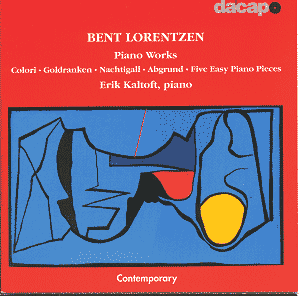Doubtless it is my loss that much of the piano
music of Bent Lorentzen has caused me little but disappointment.
Born in 1935 he is a distinguished composer, a prizewinner and
senior figure in Danish musical life. The extensive notes to this
exceptionally well-produced disc are fulsome about the pieces
and descriptive to a great extent. Sympathetic though I am to
all of this I found the disparity perhaps its better to say
the disparity I found between textual exegesis and musical reality
too great a gap. Colori depicts five different colours.
Marcato single notes, drilled or hammered notes, contemplative
stasis and treble glint accompanied by insistent flurries are
the means employed to convey the colouristic potential embedded
in the music. Nail scrapes on the strings are also used to convey
glissandi and "knocking chords". None of these procedures
are in any way antithetical in themselves to my enjoyment but
the music is.
Goldranken is slow moving, rather delicate
and dull. Nachtigall for piano and bass clarinet is in
unconventional form and lasts over thirteen minutes. It is well
played by the performers. Abgrund (1994) is written in
a much fuller, chordal style. The notes refer to this as his Wagner-inspired
chromatic period and the difference between the sparse writing
of the other works and the insistence of this is striking. There
is a spirit of toughness and active determination in the first
part and a more free spirited treble oriented abandon in the second.
The Five Easy Pieces with which this disc ends were his
first published piano works back in 1971 and are minimalist squibs.
Jonathan Woolf
